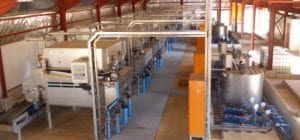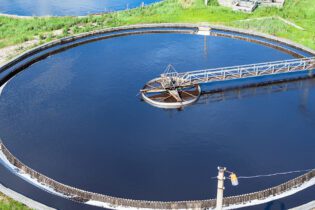Sludge dewatering equipment manufacturer Teknofanghi exports 95% of all manufactured units from its factory in Italy. Giampiero Donida, Head of Global Sales, speaks to Water&Sanitation Africa about the business of thickening and dewatering sludge from wastewater treatment.
As an Italian company with an impressive global footprint, do you feel there are differences between the sludge handling industry in South Africa and the other countries you operate in?
GD There are no significant differences between South Africa and other countries. There are slight disparities regarding legislation. But if you look at any single country, the dewatering of sludge coming from the treatment process is sometimes more demanding in certain areas (like big cities) and less restrictive in rural areas.
With over 30 years of experience in sludge handling, has the technology changed during this period?
Some new methodologies in sludge drying are starting to appear. But the most notable trend in the industry is the need to remotely control and monitor sludge handling equipment. Automation is important. Our clients also want equipment that is simple to operate, as they do not want to rely too much on manufacturers and suppliers for training or maintenance. Teknofanghi designs and manufactures equipment based on these demands.What sets Teknofanghi apart from the competition?
We export the majority of our equipment, so it is important that the life-cycles costs in terms of transportation, commissioning, operation, maintenance and service are as low as possible. When choosing sludge handling equipment, one has to take into account theseadditional costs. Teknofanghi continually invests into research and development, where we focus on a ‘plug and play’ approach. Our machines are dispatched fully assembled. Technicians are not needed for the start-up and commissioning of our equipment. This means that our equipment is up and running with no delays and lower expenses. Furthermore, it is shipped in standard containers, making transport safer and less costly.
How are you contributing towards sustainable sludge management?
Sludge management is only a part of our focus on sustainability – we like to look at the full picture. When developing our equipment, we consider the disposal of materials of construction as well as our equipment’s running costs in terms of electricity consumption. We have also invested a substantial amount of money into the installation of a photovoltaic system in our factory.
What types of technical support do you offer in terms of training, breakdowns, maintenance and spare parts in South Africa?
As stated earlier, we have designed our equipment to be easy to install, operate and maintain, with minimal training required. Maintenance can be done by operators or local technicians. Furthermore, the South African market is familiar with our equipment and we have developed several local partnerships that can supply spares (many of which are market standard). As we have a large export market, we also make sure that it is easy for companies to purchase parts directly from us in Italy should they need them,and we do provide online support.
Give a brief description of your product range and tell us about your most popular product sold in South Africa and why?
The range of Teknofanghi technologies covers applications in sludge dewatering from very small municipal and industrial plants to large municipal potable and wastewater treatment works. We supply:- Monobelt belt presses for larger and very large applications
- Teknobag-Draimad bags for smaller applications
- Scrudrain rotary drum thickeners with Archimedean screw inside
- Scrupress dewatering dehydrator press
- Polydilution polymer units for polyelectrolyte preparation and mixing
- other dewatering plant accessories like pumps, mixers and conveyors.







